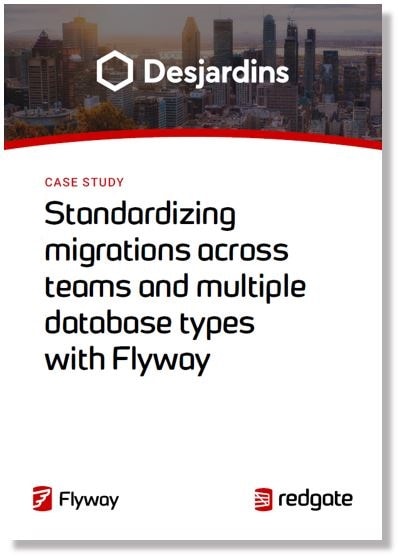Why standardizing migrations across multiple database types with Flyway adds up for Desjardins
 A new case study shows how Desjardins uses Flyway Teams to standardize the way migration scripts are created and versioned across its multi-database estate, which includes Oracle, SQL Server and PostgreSQL.
A new case study shows how Desjardins uses Flyway Teams to standardize the way migration scripts are created and versioned across its multi-database estate, which includes Oracle, SQL Server and PostgreSQL.
With assets of over $350 billion and seven million members and clients, Desjardins is the leading financial cooperative in North America. Originally established in Quebec to provide savings and credit services to its members, it now offers a full range of financial products including retail banking, asset management, and personal and damage insurance.
Technology plays a big part in developing, maintaining and delivering its services, and several hundred databases in the development and production environments support the many and varied applications in use. Some are on-premises Oracle, Db2 and SQL Server databases, while others are Platform as a Service instances using PostgreSQL and Azure SQL.
The development Database Administrator team at Desjardins naturally want to release changes to those databases frequently to keep up with the pace of application development. With many developers deploying changes to multiple types of databases, however, it was often hard to keep track of the database schema versions in each environment, and who was deploying what and when.
To alleviate this, the development team decided to standardize the way migration scripts are created, and deployments are made, across every database and every environment. Fortunately, some developers were already using the Community edition of Flyway, the world’s most popular open source migrations framework, to create migration scripts for database deployments on small projects.
Flyway allows developers to manage migration scripts with confidence across 20 of the most common database engines, regardless of the platform used, so they looked at the Teams edition which has added functionality like undo scripts and the ability to perform dry runs of deployments.
They soon discovered that standardizing the way migration scripts are created and versioned across the different databases in use reduced errors and gave better insights into the deployment state of every environment.
Automating deployments also means the team are now releasing changes up to 40 times per day and, even though they are deploying changes faster, they now have a complete picture of which schema versions are in use in every environment.
For developers, Flyway Teams has brought reliability to database deployments, whichever database they are working with, and made them both faster and easier. For IT management, the visibility Flyway Teams provides across every environment increases confidence in the frequency of database deployments.
Perhaps the best validation of Flyway is the comment made by one of the members of the development team:
Flyway brings databases into the 21st century with source control management and version schemas.
To find out the full story about how Desjardins uses Flyway Teams to standardize the way migration scripts are created and versioned across its multi-database estate, download the case study.
And to discover more about how Flyway Teams can help you automate database migrations, and overcome the technical challenges of managing multiple schemas and multi-environment deployments, read the following posts from the Redgate and Flyway blogs:
- Why and how you should automate database migrations
- Handling multiple schemas in the same database with Flyway
- A simple way to manage multi-environment deployments
To see just how fast and easy those database migrations are, download a fully-functional, 28-day free trial of the Flyway Teams edition.